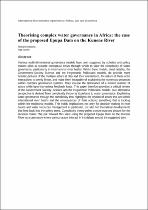 ResearchSpace
ResearchSpace
Theorising complex water governance in Africa: the case of the proposed Epupa Dam on the Kunene River
JavaScript is disabled for your browser. Some features of this site may not work without it.
- ResearchSpace
- →
- Research Publications/Outputs
- →
- Journal Articles
- →
- View Item
| dc.contributor.author |
Meissner, Richard

|
|
| dc.contributor.author |
Jacobs-Mata, Inga M

|
|
| dc.date.accessioned | 2014-07-18T09:42:14Z | |
| dc.date.available | 2014-07-18T09:42:14Z | |
| dc.date.issued | 2014-04 | |
| dc.identifier.citation | Meissner, R and Jacobs-Mata, I.M. 2014. Theorising complex water governance in Africa: the case of the proposed Epupa Dam on the Kunene River. International Environmental Agreements: Politics, Law and Economics, pp 1-28 | en_US |
| dc.identifier.issn | 1567-9764 | |
| dc.identifier.uri | http://download.springer.com/static/pdf/989/art%253A10.1007%252Fs10784-014-9250-9.pdf?auth66=1404382553_020d15cf64b36bd35bbee3313f10db40&ext=.pdf | |
| dc.identifier.uri | http://hdl.handle.net/10204/7500 | |
| dc.description | Copyright: 2014 Springer. This is an ABSTRACT ONLY. The definitive version is published in International Environmental Agreements: Politics, Law and Economics DOI: 10.1007/s10784-014-9250-9 | en_US |
| dc.description.abstract | Various multi-dimensional governance models have been suggested by scholars and policy makers alike as suitable conceptual lenses through which to view the complexity of water governance, particularly in international river basins. While these models, most notably, the Government–Society–Science and the Hegemonic Politicians models, do provide more holistic pictures of the multiple actors at play and their interactions, the nature of these actor interactions is overly linear, and make them incapable of explaining the numerous processes within complex governance systems. They assume the dominance of a limited number of actors while ignoring various feedback loops. This paper therefore provides a critical review of the Government–Society–Science and the Hegemonic Politicians models. Our alternative perspective is derived from complexity theory as it pertains to water governance. Explaining water governance through the complexity lens highlights the myriad of actors that act within international river basins and the consequences of their actions; something that is lacking within the traditional models. This holds implications not only for decision-making in river basins and water resources management in particular, but also for theoretical developments that feed back into the policy arena. Complexity theory paints a more nuanced picture for the decision maker. We put forward this view using the proposed Epupa Dam on the Kunene River as a case study where various actors interact in the debate around the suggested dam. | en_US |
| dc.language.iso | en | en_US |
| dc.publisher | Springer | en_US |
| dc.relation.ispartofseries | Workflow;12918 Workflow;12999 | |
| dc.subject | Water governance | en_US |
| dc.subject | Transboundary river | en_US |
| dc.subject | Kunene River | en_US |
| dc.subject | Epupa Dam | en_US |
| dc.title | Theorising complex water governance in Africa: the case of the proposed Epupa Dam on the Kunene River | en_US |
| dc.type | Article | en_US |
| dc.identifier.apacitation | Meissner, R., & Jacobs-Mata, I. M. (2014). Theorising complex water governance in Africa: the case of the proposed Epupa Dam on the Kunene River. http://hdl.handle.net/10204/7500 | en_ZA |
| dc.identifier.chicagocitation | Meissner, Richard, and Inga M Jacobs-Mata "Theorising complex water governance in Africa: the case of the proposed Epupa Dam on the Kunene River." (2014) http://hdl.handle.net/10204/7500 | en_ZA |
| dc.identifier.vancouvercitation | Meissner R, Jacobs-Mata IM. Theorising complex water governance in Africa: the case of the proposed Epupa Dam on the Kunene River. 2014; http://hdl.handle.net/10204/7500. | en_ZA |
| dc.identifier.ris | TY - Article AU - Meissner, Richard AU - Jacobs-Mata, Inga M AB - Various multi-dimensional governance models have been suggested by scholars and policy makers alike as suitable conceptual lenses through which to view the complexity of water governance, particularly in international river basins. While these models, most notably, the Government–Society–Science and the Hegemonic Politicians models, do provide more holistic pictures of the multiple actors at play and their interactions, the nature of these actor interactions is overly linear, and make them incapable of explaining the numerous processes within complex governance systems. They assume the dominance of a limited number of actors while ignoring various feedback loops. This paper therefore provides a critical review of the Government–Society–Science and the Hegemonic Politicians models. Our alternative perspective is derived from complexity theory as it pertains to water governance. Explaining water governance through the complexity lens highlights the myriad of actors that act within international river basins and the consequences of their actions; something that is lacking within the traditional models. This holds implications not only for decision-making in river basins and water resources management in particular, but also for theoretical developments that feed back into the policy arena. Complexity theory paints a more nuanced picture for the decision maker. We put forward this view using the proposed Epupa Dam on the Kunene River as a case study where various actors interact in the debate around the suggested dam. DA - 2014-04 DB - ResearchSpace DP - CSIR KW - Water governance KW - Transboundary river KW - Kunene River KW - Epupa Dam LK - https://researchspace.csir.co.za PY - 2014 SM - 1567-9764 T1 - Theorising complex water governance in Africa: the case of the proposed Epupa Dam on the Kunene River TI - Theorising complex water governance in Africa: the case of the proposed Epupa Dam on the Kunene River UR - http://hdl.handle.net/10204/7500 ER - | en_ZA |





